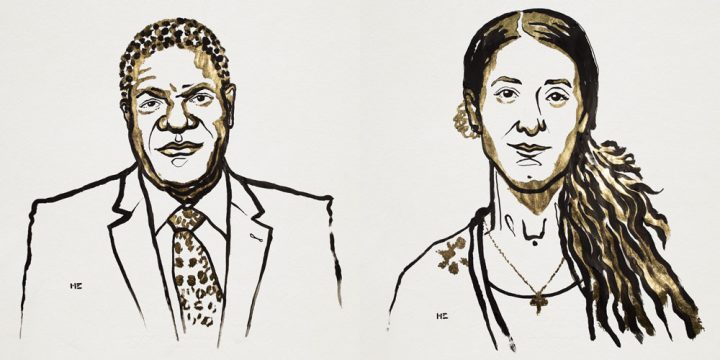In their talks at the Nobel Peace Prize ceremonies in Oslo on 10 December 2018, the co-laureates, Nadia Murad and Denis Mukwege urged concerted global action to stop rape and sexual violence as weapons of war. Dr Denis Mukwege has become an eloquent spokesperson for the effort to outlaw the use of rape as a weapon of war.
Dr Mukwege has created a clinic near Bukavu in South Kivu, Democratic Republic of Congo. The eastern area of Congo is the scene of fighting at least since 1998 – in part as a result of the genocide in neighboring Rwanda in 1994. In mid-1994, more than one million Rwandan Hutu refugees poured into the two Kivu provinces. Many of those fleeing Hutu were still armed as a couple of months before they were killing some 800,000 Tutsi and moderate Hutu in Rwanda. They continued to kill Tutsi living in the Congo, many of whom had migrated there in the 18th century.
However, violence in the eastern Congo is not limited to fighting between Hutu and Tutsi. There are armed bands from neighbouring countries who have come on the scene attracted by possible wealth from timber and mines of rare minerals. In addition, local commanders of the Congolese Army, far from any control by the Central Government, have created their own armed groups, looting, burning village homes and raping.
Dr Mukwege and a number of younger doctors whom he has trained try to care for women who have undergone rape by multiple men, one after the other, often in public in front of family members and others who know the women. Known rape, even by a single person, can be a cause of family breakup, lasting shame and an inability to continue living in the same village. There are also negative attitudes toward children born of rape. Multiple rape in the Congo is often followed by deliberate destruction of the woman’s reproductive organs.
Nadia Murad, now a United Nations Goodwill Ambassador on Trafficking of Persons, is the co-laureate of the 2018 Nobel Peace Prize. In 2014, when she was 21, she and her neighbours in a predominantly Yazidi village in the Simjar mountainous area of Iraq were attacked by the forces of the Islamic State of Iraq and Syria (ISIS). These forces were following a pattern of targeted killings, forced conversions to Islam, abductions, trafficking of women, sexual abuse and slavery. In Murad’s village, most of the older men were killed, the younger men taken to be soldiers in the ISIS forces. The women were taken into slavery, primarily as sex slaves to Mosul, the city which was serving as the headquarters of ISIS.
There were some 500,000 Yazidi in Iraq, though Iraqi demographic statistics are not fully reliable. There also had been some 200,000 Yazidi among the Kurds in Turkey, but now nearly all those in Turkey have migrated to Western Europe, Australia, and Canada. The government of Saddam Hussein was opposed to them not so much for their religious beliefs but because some Yazidi played important roles in the Kurdish community seen as largely opposed to his government.
The structure of the Yazidi world view is Zoroastrian, a faith born in Persia proclaiming that two great cosmic forces, that of light and good, and that of darkness and evil, are in constant battle. Man is called upon to help light overcome darkness. However, the strict dualist thinking of Zoroastrianism was modified by another prophet from Persia, Mani of Ctesiphon in the third century CE. Mani tried to create a synthesis of religious teachings that were increasingly coming into contact through trade: Buddhism and Hinduism from India, Jewish and Christian thought, Gnostic philosophy from Egypt and Greece. Mani kept the Zoroastrian dualism as the most easily understood intellectual framework, though giving the dualism a more Taoist (yin/yang) character. Mani had visited China. He developed the idea of the progression of the soul by individual effort through reincarnation – a main feature of Indian thought.
After a time as a sex slave in Mosul, Murad, with the help of a compassionate Muslim family, was able to escape Mosul and made her way to the Iraqi Kurdistan area where many Yazidi from the Sinjar area had already arrived. Once there, she joined a newly created association of Yazidi women who had organized to defend their rights so that women’s voices could be heard. A few of these women were able to be resettled in Western Europe. She was able to live in Germany where she became the spokesperson for Yazidi women who had met a similar fate. In December 2015, she addressed the U.N. Security Council and became the public face both for the Yazidi women but also for an even larger number of women victims of the fighting in Iraq and Syria.
The Nobel Peace Prize will help focus world attention on rape and the captivity of women as weapons in war. This is a theme of world law which the Association of World Citizens has stressed in the U.N. human rights bodies in Geneva starting with cases during the conflicts which followed the breakup of the Yugoslav Federation. Nadia Murad and Denis Mukwege can be seen as bringer of light into a dark world.






